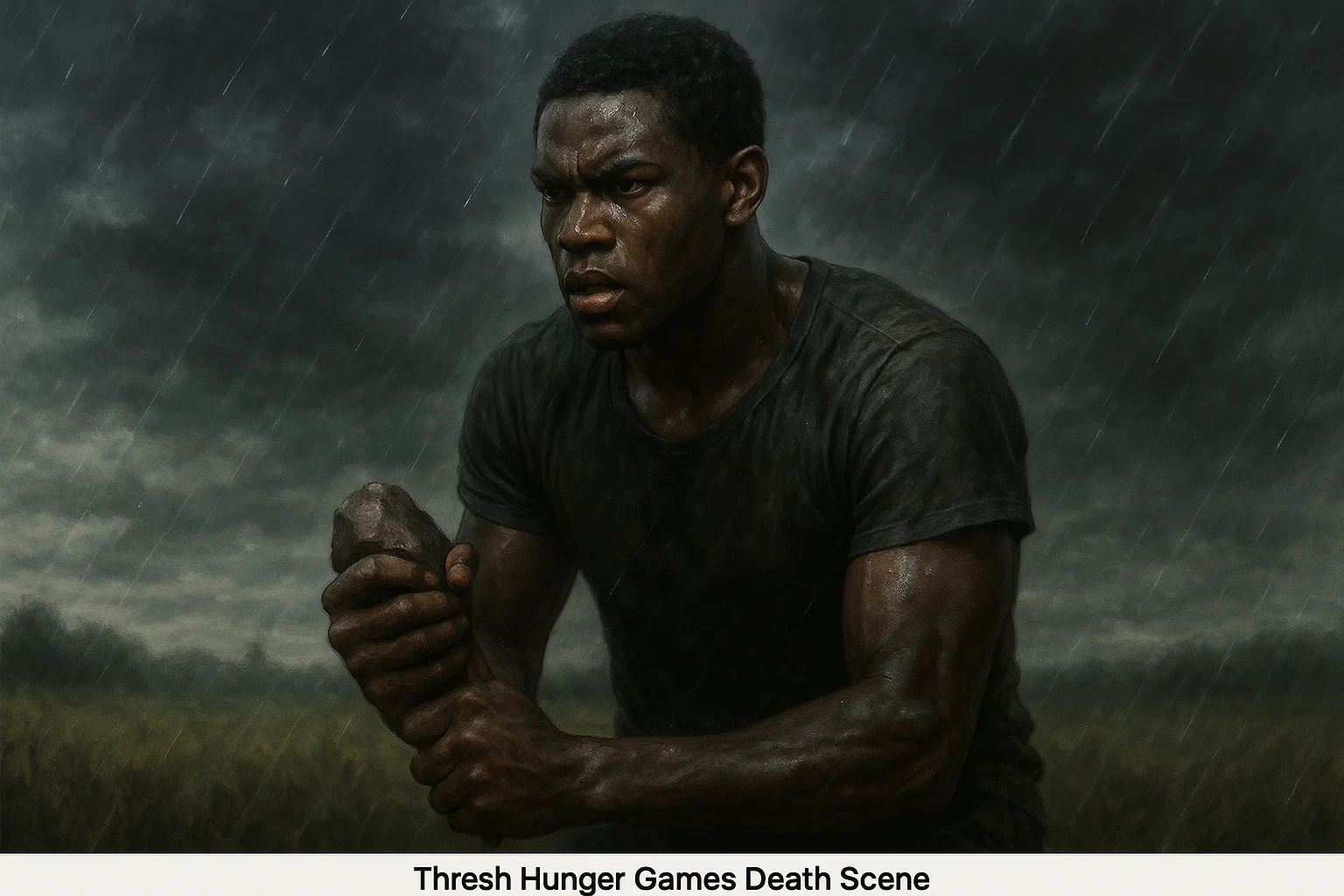The Scene Everyone Missed
Of all the deaths in The Hunger Games, Thresh’s is the one that still stings. Maybe because we never saw it happen. Maybe because he deserved better. Or maybe because, for one fleeting moment, he was the only one who truly understood mercy in a place built to crush it.
His death didn’t make the front-page drama of Rue’s heartbreak or Cato’s final showdown. It happened off-screen, almost quietly. And that silence made it heavier. Let’s rewind for a second and talk about who Thresh really was and why his story still echoes long after the cannon fired.
Who Was Thresh in the Hunger Games?
Thresh was the male tribute from District 11, the same district as Rue the agricultural district known for hard work and even harder lives. In Suzanne Collins’s book, he’s described as tall, strong, and stoic. He barely spoke, yet every word he said carried weight.
He wasn’t cruel like the Career tributes from Districts 1 and 2. He didn’t chase glory. He stayed to himself, watching, waiting. When the Games began, he used his strength wisely hiding out, staying alive, and refusing to play by the Capitol’s bloody rules.
To Katniss, he was intimidating but fair. When he found her trapped by Clove a ruthless Career tribute about to kill her Thresh stepped in. He killed Clove instantly and spared Katniss because of what she’d done for Rue. His words, “Just this one time, I’ll let you go for Rue,” carried more humanity than anything the Capitol ever broadcast.
In that moment, Thresh wasn’t just a competitor. He was a man holding onto his moral compass in a world built to destroy it.
The Unseen Death: What Really Happened to Thresh
If you only watched the film, you might have missed it. Thresh’s death isn’t shown at all. One moment he’s storming off after killing Clove, and the next, Claudius Templesmith announces that Thresh is dead.
In the book, we get a little more detail but not much. Collins writes that Katniss hears a distant cannon boom after a storm. The implication is clear: Thresh was killed, but we never see who did it.
Later, Cato himself confirms it during the final showdown: “You know Thresh? He’s dead too. Killed him myself.” That’s all we get. No description, no fight scene, no heroic end.
This vague death was intentional. Collins wasn’t writing for spectacle; she was writing about the cruelty of war where even the strongest can vanish in a heartbeat, uncelebrated and unseen. Thresh’s death was one more symbol of how the Capitol erased dignity from life and death alike.
Why Did They Change Thresh’s Death in the Movie?
The filmmakers faced a tough call. Thresh was already a minor character compared to Katniss, Peeta, and Rue. Showing his death might have shifted focus away from the emotional core of the story.
So, instead of staging his death, the movie left it off-screen a creative choice that worked both narratively and symbolically. Thresh was a quiet rebel. His exit mirrored his character: silent, strong, and tragic.
Director Gary Ross once said that The Hunger Games was less about violence and more about emotion. He wanted viewers to feel the horror through what wasn’t shown. Thresh’s absence became part of that design a reminder that the Games didn’t need gore to be brutal.
Still, for fans of the book, the mystery surrounding his death left a bitter aftertaste. A warrior like Thresh deserved a moment not a whisper.
The Cato Connection: Who Killed Thresh and How?
Cato claimed the kill, but it’s worth analysing how that would’ve gone down. Cato was ruthless, trained, and heavily armed. Thresh was powerful but had been alone and on the run.
The arena had just erupted in chaos after the rule change allowing two winners. Thresh was likely exposed by the storm lightning flashing, thunder cracking, rain revealing his position. Cato, being part of the Career pack and armed with better weapons, had the tactical advantage.
Their fight was probably brutal. Cato wasn’t the type to win cleanly. Thresh’s strength would’ve made it a struggle two titans colliding while the Capitol watched. But eventually, exhaustion, exposure, or sheer numbers tipped the balance.
No one mourned Thresh publicly, but you can imagine even Cato felt the weight of that victory. Killing Thresh wasn’t like killing a helpless tribute. It was conquering a force of nature.
The Saddest Deaths in the Hunger Games Universe
Thresh’s death hurts because of what it represents, not how it happened. But he’s not alone in that heartbreak club. The series is full of losses that still haunt readers and viewers years later.
Rue The symbol of innocence. Her alliance with Katniss was the heart of the story. Her death was soft and devastating, a quiet rebellion against the Capitol’s cruelty.
Finnick Odair The charming victor from District 4 who became a tragic casualty of the rebellion. He survived the arena but couldn’t escape the Capitol’s shadow.
Prim Everdeen Katniss’s sister, the reason for everything. Her death in Mockingjay wasn’t just sad; it was soul-crushing. It shattered the idea that any of this had meaning.
Thresh The silent moral anchor. His death wasn’t cinematic it was stripped of spectacle, which made it all the more human.
If Rue’s death broke our hearts, Thresh’s death reminded us that strength doesn’t guarantee survival. It only highlights how unfair the system really was.
The Justice That Defined Thresh
What made Thresh unforgettable wasn’t just his strength it was his sense of justice. When he killed Clove, it wasn’t rage; it was righteousness. He didn’t take pleasure in it. He simply balanced the scales for Rue.
That act of mercy toward Katniss showed that even inside the arena, humanity could flicker through the darkness. Thresh didn’t owe Katniss anything, yet he spared her because he understood the meaning of loyalty.
His death later on becomes even more symbolic justice doesn’t survive in systems built on cruelty. The Capitol couldn’t allow someone like Thresh to live. His compassion was a threat to their entertainment.
In many ways, Thresh’s moral clarity made him dangerous. And that’s why his death, quiet as it was, speaks volumes.
The Unspoken Symbolism Behind His Character
Thresh wasn’t just a strong tribute; he was a reflection of dignity under pressure. Fans often overlook that his character, particularly in District 11’s context, carried deep racial undertones.
In both the book and movie, Thresh (and Rue) were described as having dark skin. Their portrayal resilient, kind, yet ultimately crushed by the system struck a chord with audiences who saw echoes of real-world injustice.
When District 11 later rebelled after Rue’s death in Catching Fire, it wasn’t random. It was the boiling point of years of silent pain. Thresh’s and Rue’s fates were the spark. They embodied the voiceless strong yet silenced, moral yet doomed.
Their legacy outlived them. Without Thresh’s moment of mercy, Katniss might never have understood what real integrity looked like.
The Psychological Impact of Thresh’s Death
There’s something unnerving about not seeing how someone dies. Our minds fill in the blanks, often making it worse than anything the screen could show. That’s what makes Thresh’s death so effective.
For Katniss, the sound of the cannon marked more than another fallen tribute. It was the loss of the only other person in the arena who truly “got it.” Rue’s protector was gone. Her own sense of safety vanished with him.
For the audience, it was the moment we realised that no one not even the morally grounded or physically dominant could survive the Capitol’s game. It wasn’t about fairness or strength. It was about control.
The Games weren’t designed for heroes. They were designed to break them.
The Quiet Power of Off-Screen Deaths
In storytelling, especially dystopian fiction, not every death needs a visual payoff. Collins understood that subtlety can be louder than spectacle.
Thresh’s off-screen death forces readers to sit with discomfort. We don’t get closure, and that’s the point. Neither did the tributes. They never got to say goodbye, never got to grieve properly.
That narrative gap creates empathy. Readers feel the injustice not through gore, but through absence. The Capitol’s cruelty wasn’t just in killing; it was in erasing.
By keeping Thresh’s death off-screen, Collins turned him into something bigger a symbol of everything lost to the Capitol’s machine.
Why Thresh’s Death Still Matters Today
Years after the final film, Thresh’s story still resonates because it’s more than fiction. It mirrors real life where good people get swallowed by systems that reward power and punish empathy.
Thresh represented quiet resistance. He didn’t play their game; he refused to be a spectacle. His death reminds us of those who stand up, even briefly, and get crushed for it.
And here’s the thing: his kindness outlived him. By sparing Katniss, he indirectly saved Panem. Without that act, there might never have been a Mockingjay.
It’s poetic, really the revolution sparked by someone who never wanted fame, who simply did what was right.
The Saddest Truth About Thresh’s End
Thresh died alone, unseen, and uncelebrated. But that’s also what made him unforgettable. He didn’t die for the cameras. He didn’t die screaming for mercy. He just… stopped being part of the story and that’s the cruelty of the Games in its purest form.
Fans often debate who had the saddest death Rue, Prim, Finnick but Thresh’s stands apart because of its stillness. There’s no closure, no comfort, just the cold reminder that decency rarely survives in corrupt systems.
In a world obsessed with survival and spectacle, Thresh’s death is the quiet protest that lingers.
What His Legacy Teaches Us
If you strip away the arenas, the mutations, and the Capitol, The Hunger Games is about morality how people hold onto their humanity when everything’s against them.
Thresh was proof that strength and kindness can coexist. His choices shaped the rebellion in ways he never saw. The mercy he showed became the moral blueprint Katniss carried forward.
Every revolution starts with a small act of courage. For Thresh, it was sparing a girl out of respect for another. It’s poetic justice that such a small gesture sparked the downfall of an empire.
So yes Thresh died. But his spirit didn’t. It lived on in every moment Katniss chose compassion over vengeance.
The Bottom Line
Thresh’s death may not have been flashy, but that’s what makes it powerful. It was raw, human, and painfully real.
In a story built on survival, his quiet morality stands as one of the purest acts of rebellion. He didn’t need the spotlight. He didn’t crave glory. He just wanted to do right by Rue and in doing so, he changed the course of the story forever.
That’s why, even now, years later, when fans ask “How did Thresh die?”, the real answer isn’t how it’s why it still matters.
Because Thresh wasn’t just a tribute. He was the conscience of The Hunger Games.

Emily is a skilled content strategist and writer with a passion for digital marketing and SEO trends. A Leeds alumna, she brings her expertise in media communication to Spinbot UK Blog, crafting engaging content that drives traffic and enhances user engagement.
